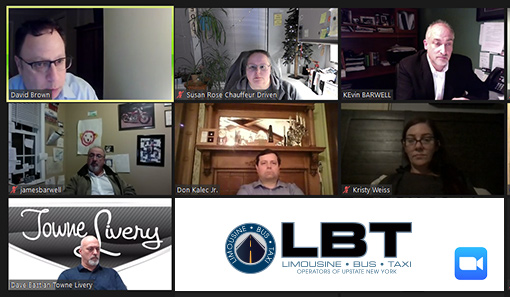It was a meeting packed with information for the first Limousine, Bus, and Taxi Operators of Upstate New York (LBTOUNY) event of 2021, as there have been plenty of legislation passed in the state that is impacting businesses. The two-hour meeting, held via Zoom, included about two dozen members from all over the Upstate New York region.
After some housekeeping items from LBTOUNY President Kevin Barwell of Giorgio’s Limousine regarding the state’s mandates on COVID cleaning and safety procedures for businesses, Board member David Brown of Premiere Transportation of Albany gave a rundown on the financial safety nets available to operators, including both rounds of the Paycheck Protection Program (PPP) and $2 billion CERTS funding, which is an upcoming grant that will be available to motorcoach operations in the coming weeks. CERTS is expected to be a competitive program as the definition of which industries qualify is wide-ranging (traditional limousine operators are not included). Many members reported that they have applied for and received funds through the PPP; Brown encouraged all to apply for if they hadn’t done so already.

As operators look forward to an increase in business in the near future—and consider bringing back staff to accommodate—the state’s updated paid sick leave regulations could be a new challenge. Brown ran through the major aspects of the law, which went into effect in September 2020 for accrual and could be used by employees as of January 1, 2021, as it applies to both part- and full-time workers and is based on the size of the company. Leave is accrued at a rate not less than one hour per every thirty hours worked. Alternatively, employers may grant the full number of hours at the beginning of the calendar year.
According to guidance from NYS:
- Employers with 100 or more employees must provide up to 56 hours of paid sick leave per calendar year.
- Employers with 5 to 99 employees must provide up to 40 hours of paid sick leave per calendar year.
- Employers with 4 or fewer employees and net income of greater than $1 million in the previous tax year are required to provide up to 40 hours of paid sick leave per calendar year.
- Employers with 4 or fewer employees and net income is $1 million or less in the previous tax year are required to provide up to 40 hours of unpaid sick leave per calendar year.
Brown warned that the reason an employee can give to use the time is broad—from illness to providing care for a family member to securing safety in domestic violence situation—and that employers must respect all HIPAA privacy laws in granting that time off. More information about the updated regulations can be found here.
Additionally, the state requires that employees receive sexual harassment prevention training upon hire, and all current employees should have already completed the training, with updates annually. Barwell warned that the state most likely will be cracking down on businesses and assessing fines, especially as it’s hurting for revenue, so he urged members to make sure that they are up to date and are keeping meticulous records. He also noted that tickets for passengers not wearing masks or seat belts in vehicles have become more frequent, and advised that all companies ensure that chauffeurs are diligent in enforcing.
Next up, LBTOUNY Board Director David Bastian of Towne Livery shared some FAQs on DOT regulations. Members noted that there have been some discrepancies between the passenger count assessed by the DOT and registering the vehicle through the Department of Motor Vehicles, which could cause some gray area for CDL requirements. The state now includes the driver in the passenger count. Bastian also encouraged all operators to keep an eye on the NYS Assembly website for bills specific to limousines, as the legislative effects from the Schoharie crash are still lingering.
Mark Crisafulli from Haylor, Freyer & Coon provided updates on the insurance market for N.Y. operators. He noted that many insurers are limiting the age of limousines that they will insure—often no older than 12 or 15 years. He thinks this may hasten the retirement of limousines in a part of the state that still regularly uses them. Crisafulli also warned that the excess insurance market is tightening in the state, which could make it difficult to ensure those limousines with a $5 million policy, and that several insurers are defaulting to full coverage if COVID-suspended vehicles are used more frequently, often more than seven times per month.
Members are eager to once again meet in person, although Barwell thinks the first in-person event won’t likely happen until the association’s annual August baseball meeting. The next meeting is expected in late spring, possibly in April or May.
Visit lbtony.com for more information and updates.
[03.03.21]

